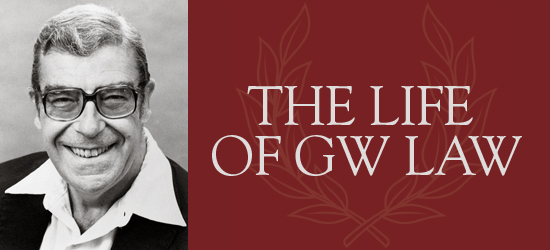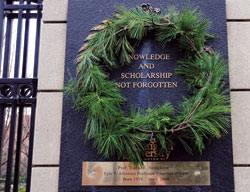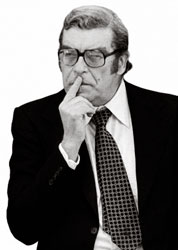
Professor David E. Seidelson (1929-2008), the Lyle T. Alverson Professor Emeritus of Law, taught at GW Law from 1960 to 1998.
Stan Barouh
Professor David Seidelson left a lasting impression on many GW Law students of the past 40 years. A colleague and close friend shares his memories.
By David Robinson Jr., professor emeritus of law
In 1965, when I joined The George Washington University Law School faculty, a student who had heard David Seidelson while he was on a student recruiting trip told me something that stuck in my mind. He said, “Professor Seidelson is a remarkable man.” In the ensuing years I came to realize the accuracy of the student’s observation. Only a few days ago, a neighbor of mine came to my home to tell me that Seidelson was the finest law teacher that he had at George Washington, meticulously prepared, including massive library research on material to be covered in class, skilled at classroom questioning and debate, and a fair though hard grader. While most students were a bit awed by his performance, occasionally some would prepare themselves to challenge him. They were invariably unsuccessful.

This wreath and plaque adorned GW’s Professor’s Gate at the time of Seidelson’s death.
Jessica McConnell
David was born and raised in the Hill District in Pittsburgh, a tough, inner-city neighborhood. His father, ultimately a dentist, had been a professional football player. David regarded him as the finest athlete he ever knew. His father told David that to avoid being a prisoner in his own home, David would have to learn to fight, and he did. He once demonstrated his street fighting stance to me, crouching very low with arms and fists spinning like blades of a buzz saw.
After college and a period of serving in intelligence in the military, David attended law school, again in Pittsburgh. After graduation David joined the small firm where he had worked part time as a student. He handled their trial work. In four years he tried some 200 cases, mostly civil, often representing plaintiffs in personal injury cases. He was extremely successful. My impression is that the assertiveness that he learned in order to survive on the streets of the Hill District influenced his approach to litigation and later, his advice to students on how to successfully try a case. In his discussions with me, David avoided locutions such as “I was defending the law, not my client,” or “I felt the result I sought was a just one.” He simply said, “I wanted to win.” But David also benefited from his great capacity for hard work, his unusual intelligence, and his seemingly photographic memory. He could fix his attention on witness and counsel in the courtroom, not distracted by his notes. “I did not need them,” he told me. He was also uncommonly disciplined in his personal habits. When David decided to quit smoking, he kept a pack of cigarettes topped by a book of matches on his desk, perhaps to demonstrate to himself that he did not yield to temptation. Another example of his self-command: Grading examinations for large classes is a tedious, repetitive process, disliked by most faculty members and sometimes prolonged for several weeks. David would do it in three days of continuous work.
David Seidelson and I both taught evidence for 33 years. During most of that time we had lunch together on Tuesdays. (For a relatively brief period Roger Schechter also taught evidence and joined us and enriched the discussion.) I learned a lot of law at those lunches but also came to treasure a friendship that became one of the most rewarding aspects of my own academic career. David became not only a friend and colleague. During several disheartening periods of my own personal life, I sought his counsel and advice. He responded generously … and wisely as well.
David was an unusually demanding classroom teacher. Jerry Caplan, who left our faculty to become a dean in California, used to teach contracts in the same freshman section in which David taught torts. Jerry told me that he greatly missed having students who had been exposed to the rigor of David’s stand-on-your-feet, careful, highly Socratic questioning and analysis. And for those who wished to review their examinations, David was widely known to be willing to devote hours to individual review and helpful commentary. Other faculty members emphasized his meticulous understanding of legal doctrine. In contexts such as these his gentleness and courtliness were remarkable.
University faculties are asked to do a lot of committee work. It is time consuming and often seen as unrewarding, and many do as little as they can. David was not one of these. He served on some of the most active committees at the Law School and also on the Faculty Senate of the University. He also served as an adviser to The George Washington Law Review, the Moot Court Board, and many moot court teams. Still, he found time to publish more than 70 legal articles, some of which have been cited by courts of all levels, including the U.S. Supreme Court. When the Alverson endowed professorships were created, it was clear that one, in justice, should be awarded to David Seidelson, and it was.
Personally, I have lost a mentor, a colleague, and one of my dearest friends. Many others feel similarly. The Law School has had many talented faculty members and students, but none more valuable and unique than David Seidelson.
In Seidelson’s Words

David Seidelson teaching a class, circa 1980.
In addition to the countless hours he dedicated to students, David Seidelson also occasionally wrote first-person articles for GW Law School magazine about his time at GW.
In a 1997 article, he described members of the Class of 1972 and what it was like at GW Law in the height of the antiwar protests that happened just outside school doors:
Shortly before I was ready to leave my office in Burns for a class in room 10 of Stockton, Ed Potts, then associate dean and still a cherished friend, phoned me.
“‘I suggest you enter Stockton by the rear door.”
“How come?”“There are protesting students five-deep at the front door.”
“Thanks for letting me know.”
I left my office and followed my usual route to class. As I approached the students blocking the door, I said, “Pardon me,” and walked through the students in the front door. I touched no student and no student touched me. After class I returned to my office by the same route. As I entered the office, the phone rang. It was Ed Potts. He had watched me through the window of his office on the first floor of Stockton.
“I knew you’d do that. Why didn’t you use the rear door?”
“Ed, if I can’t enter a classroom building by the front door, I may as well pack up and leave.”
In a 1994 article, Seidelson described some of the pleasures of teaching law:
One of those pleasures, especially at a law school like GW that attracts students from all over the country, is that wherever I go I’m likely to run into a former student. One day in San Francisco, just as I hopped on a cable car, I heard someone say, “Hi, professor Seidelson.”
He was a former student, practicing in New York, and, like me, vacationing in San Francisco. And we wound up on the same cable car. One day in Boston, as I was taking a walking tour of that historic city, I heard someone say, “Hi Professor Seidelson,” Another former student. And one evening in London, just as my wife and I were about to board a boat for a sightseeing cruise on the Thames, a young woman ran over, threw her arms around me and gave me a big kiss. Another former student — as I explained to my wife.
Some of the former students are kind enough to drop a line occasionally. Several years ago I received a note that read: “Dear Professor Seidelson, Thanks to your conflicts class, I just settled a wrongful death action for $1.5 million.”
I took another peek into the envelope, blew into its slit end, then shook it. There was no enclosed check. And, of course, that’s exactly the way it should have been. My reward—and pleasure—was the success of the former student.
In that same article, Seidelson described how he felt just before teaching a class:
The classroom exchanges are almost invariably a delight.…It’s the apprehension before class that’s painful. Will the class work? Will the hypothetical cases play? When all the pre-class preparation is finished and I’ve checked the zipper on my fly for the last time, I’m as antsy as I was before my first class way back in 1960.
Seidelson also commented on the changes he had seen in his career to that point:
Whether or not the current students are a little less mature when entering law school and whether or not they’re a little more thin-skinned, they are extraordinarily bright and a delight to work with. They’re responsible for all of my good classes and generally tolerant of the bad ones. The law remains fascinating and ever changing and the work requires no heavy lifting. That’s why I’ve lived with the apprehension and kept checking my fly all these years....
Full text versions of these articles are available online at www.gwmagazine.com.
Do you have a memory of David Seidelson that you would like to share? E-mail us at magazine@gwu.edu. We will publish them in the next edition of GW Law School magazine. Letters may be edited for space or clarity.
The Seidelson Lectureship
The David E. Seidelson Professorial Lectureship in Trial Advocacy endowment fund was established in 1999 by various donors to honor Professor Seidelson. Income earned by the fund is used to support a professorial lectureship position. Hon. Ricardo M. Urbina was appointed the David E. Seidelson Professorial Lecturer in April 2005 and continues to carry the Seidelson title.
Contributions to honor Professor Seidelson’s memory are welcome. Checks should be made out to GW Law School Seidelson Endowment, and mailed to GW Law School, Development Office, 2000 H Street N.W., Washington DC 20052.
For additional information please contact Rich Collins at the Law School Development Office: (202) 994-6117.
|
|